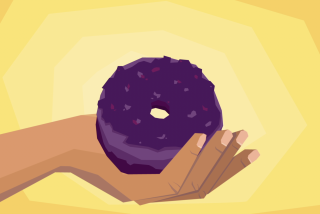Beware the American Idolization of all culture
- Share via
If you haven’t already, you still have time to vote. The deadline for casting ballots for Dunkin’s Next Donut is Monday at midnight. It’s the latest in the let-the-people-decide craze. The doughnut chain has asked you and me to design and vote on newfangled goodies the company can sell. A panel of judges has narrowed the competition down to an even dozen (get it?) finalists, and now it’s up to Mr. and Ms. America to go online to choose whether the Mango Fandango (topped with pink and orange sprinkles) or the I Like You a Latte (with maple icing) will appear soon at a doughnut store near you.
Nothing wrong with that, right? It’s slacktivism — you feel like you’re doing something good while barely lifting a finger — and corporations and anyone else sponsoring a “vote” get people tangentially involved and thinking about what they do. At some level the American Idolization of all culture is merely an extension of our democratic principles, the belief, as Tocqueville put it, “that the interests of the many are to be preferred to those of the few.”
But we’re getting pretty far beyond picking pop singers and junk food. Last week, e-mail and Facebook notices urged me to support a local high school’s bid to have President Obama give its commencement address. Apparently some poor soul in the White House basement narrowed down a bunch of hopeful high schools to six finalists, and now the public is being asked to watch the videos and read the essays the students submitted and rate their favorites. The top three will then be submitted to the president, who will make the final pick. No offense to me, but what the heck do I know about rating a school’s worthiness? And are the videos and essays really an indicator?
The definition of “public” in these online contests is also troubling. Some competitions allow individuals to vote once a day throughout the voting period, and it’s hard to tell whether any given competition is about winning on the merits or the competitor’s online organizing prowess.
Once upon a time, ambitious folk could argue whether it was who you knew or what you knew that got you ahead. Today, both have been trumped by how many people you know and how many will vote for you online.
What’s at stake is a little scary too. Last year in Washington state, a community organization sponsored a talent competition in which 44 local high schoolers looking for college money uploaded videos of themselves performing and asked the public to vote for 10 finalists. It wasn’t at all clear what their acts had to do with their financial need, their scholastic abilities or their educational goals.
At some point, handing out rewards based on this kind of popularity contest starts to obscure the idea of quality, let alone merit. While democratization always sounds good, it also leads to the flattening of culture. I like McDonald’s as much as the next guy, but does “billions and billions served” really mean that Big Macs are the best food available?
Andrew Keen, the British American tech entrepreneur and self-described elitist who has railed against the culture of Web 2.0, warns that the empowerment of the masses nurtures a “creeping narcissism” that has people reading, watching and supporting only what reflects themselves.
“Instead of Mozart, Van Gogh or Hitchcock,” he writes, “all we get with the Web 2.0 Revolution is more of ourselves.”
Sounding a whole lot like early 20th century Spanish philosopher Jose Ortega y Gasset, who decried “the revolt of the masses,” Keen deplores the decline of expertise and the emergence of a society deeply infatuated by its own “popular” opinions.
Worse yet, we shouldn’t forget that all this democracy generally is put to work in the service of the powerful sponsors — be it Dunkin Donuts or the White House — who employ these contests as marketing tools. For all the public’s feeling of empowerment, it’s still the big guys who are collecting our data, counting and setting the terms before we click our mice.
So go ahead, choose pink and orange sprinkles or maple icing or whatever catches your fancy on the Dunkin list. But before you buy the top vote-getter the next time you want a pastry with your coffee, remember this: Democracy as popularity contest has its limits. A majority of clicks is no guarantee that the best doughnut wins.
grodriguez@latimescolumnists.com

